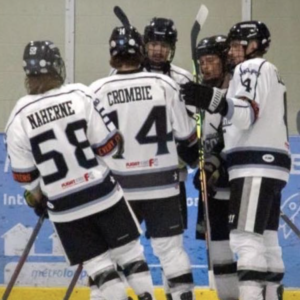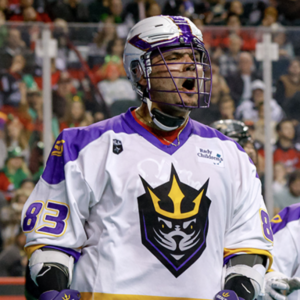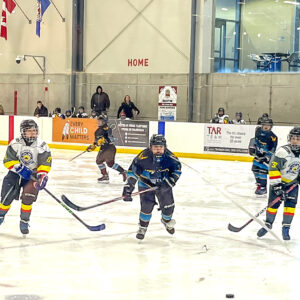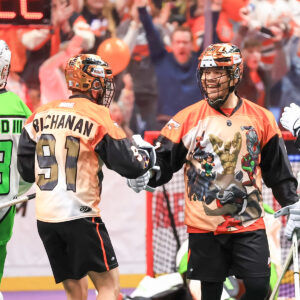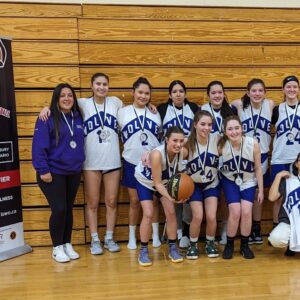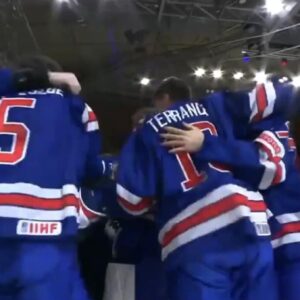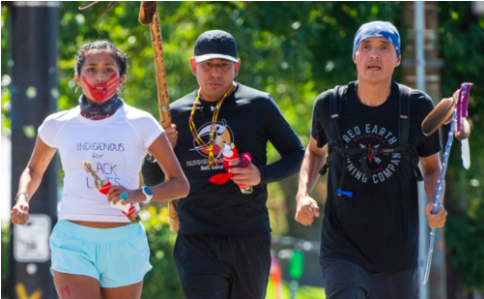
A citizen of the Kul Wicasa Oyate, also known as the Lower Brule Sioux Tribe in South Dakota, Jordan Marie Brings Three White Horses Daniel is a passionate Indigenous advocate and long distance runner.
In fact, she is a fourth-generation indigenous runner and tenacious human-rights advocate. She’s known for bringing global awareness to the missing and murdered indigenous women humanitarian crisis with a red handprint painted across her face, even as she raced in the 2019 Boston Marathon. And she’s a pioneer of intersectional activism that uses her athletic platform to raise awareness and prompt vital dialogue about important issues that aren’t secular to Indigenous people alone.
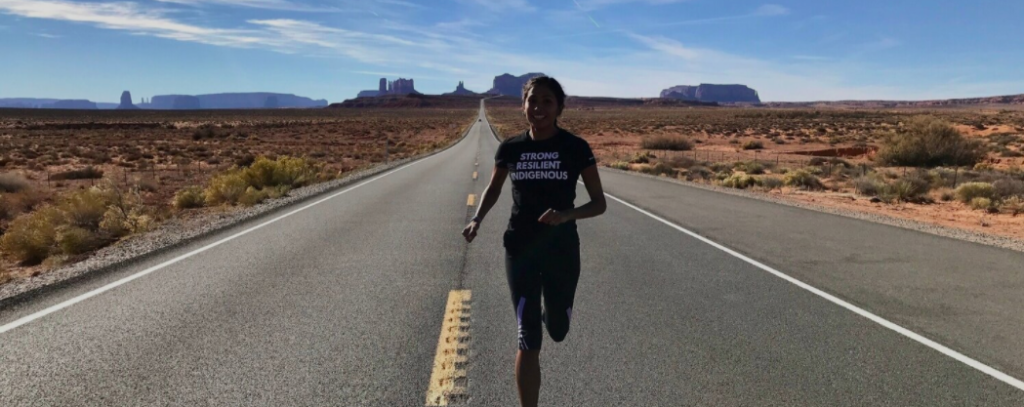
Q: To begin the interview, we are in the midst of Tom Longboat and Global Running Day;
what about running has made you feel most happy?
A: Running make me feel most happy when I’m connecting with nature, my surroundings
and enjoying the early memories of running with my grandfather, Nyal Brings – who
took me on my first run. I’m a fourth generation runner – it’s been about connection,
continuing family tradition, to representation, to finding the pure love and joy for myself,
and now, intersecting all of it, with raising awareness through running that gives me new
purpose, determination and joy.
Q: Understanding that you come from a line of runners, why do you think continuing
generational running is important as an Indigenous person?
A: It’s important to me as a Lakota and Indigenous runner to continue generational running
because running is healing, running carries messages, running is prayer, running is
tradition and running teaches you many life lessons. Traditionally, we have many
Indigenous communities, long before settler colonialism arrived to our lands, that our
ancestors ran to deliver those messages, ran to hunt and tire out their prey, running as
coming of age for many, and so much more. Running is tradition and cultural – it’s part
of who we are as Indigenous people. Ensuring that the knowledge and stories of the
past and present, are carried with us for our future generations.
What was the most fulfilling experience that came out of your athletic career currently?
My most fulfilling experience, honestly, was finding my purpose with running by helping
to raise awareness about the epidemic of missing and murdered Indigenous women,
girls, Two spirits and relatives, and other social issues impacting those continuously oppressed. Running the 2019 Boston Marathon and dedicating 26 miles to 26 missing
and murdered Indigenous women and girls gave me new purpose in how I can be using
my running platform to influence social change, informing those who may be unaware of
these issues and how to support. Inspiring Rosalie Fish, as she puts it, is something I
didn’t know would happen going into that run, but to help be that representation for our
younger generations who then inspire so many more like she did, is one of my proudest
moments. It brought us close as sisters.
Q: You have created your own non-profit organization, ran the Boston Marathon, and
continue on to utilize your platform as an advocate. Would you like to share your story
on what has brought you on the path of Indigenous advocacy?
A: I have known since I was in 8th grade that I’ve wanted to be an advocate for my
relatives, for Indigenous communities. That meant, moving to Washington, DC to lobby
on the Hill and help create change systemically that would support and have respect for
our communities, rather than to continuously oppress Indigenous peoples, folks of color
and marginalized communities. It was growing up with the perspective based of
experiences with racism, a hate crime, and seeing how Native people are treated
outside of your own community in the U.S.. It broke my heart to see that after moving
away from my family and community, to a rural town in Maine, that I was different, that
were different, and that we were invisible and forgotten. In 2013, that dream came true
to move to DC and advocate, came true. My first year and a half, I worked for a Native
health centered advocacy nonprofit and interned for a democratic Congressional
representative. I was disheartened through those experiences to see the lack of
representation of Indigenous peoples there, in the hallways of Congress and the
amount of privilege that was there. I realized things were so slow moving and
Indigenous peoples were still being pushed to the back burner of legislative discussions.
So, I quit, and started working for the Administration for Native Americans in the
Department of Health and Human Services in DC, where I was able to work closely with
our communities. It was then, that I knew my place to advocate and support, was at the
community-grassroots level. In 2016, I organized my first ‘run for water’ rally to
welcome the Standing Rock youth to Piscataway lands / Washington DC, as they ran
over 2,000 miles to oppose the Dakota Access Pipeline. That is where my heart work of
community organizing began, and where Rising Hearts was founded. It’s continued ever
since, centered in elevating Indigenous voices and what we are doing, as well as
working with an intersectional approach on bringing communities together, to mobilize,
to learn from each other’s lived experiences, and push for change from the ground up.
Q: For the young athletes reading this article, what kind of advice would you give to them in
terms of staying focused and meeting their goals?
A: My advice for young athletes, is to trust the process of running. It can teach you
structure, patience, and love. Listen to your body. Never be too hard on yourself. And
never put pressure on yourself to find your purpose or have everything figured out. It
can take years, as it did for me to find what I was meant to be doing. And just know, that
whether you inspire one person or thousands, your impact in this world is needed.
Always respect yourself. Love yourself!
Beyond Daniel’s dream of running in the Olympic Marathon Trials, she would also like to represent her family by racing in USATF trail and mountain running national championships. Even still, her activism is intertwined with her athletic goals.



